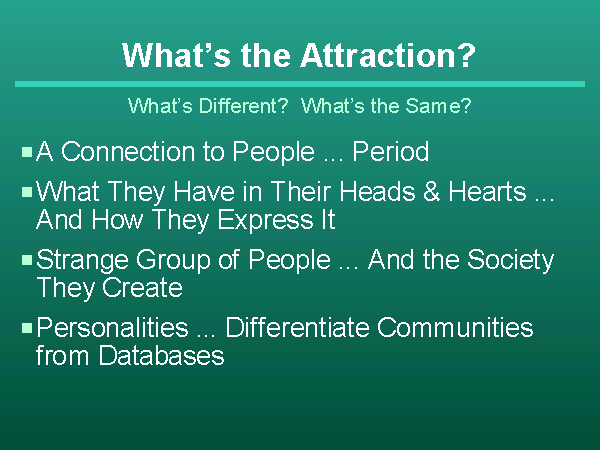





 Notes:
Notes:
Horn says online communities provide: "... a connection to people. That's all any virtual community has to offer. Period, end of story. If you don't like the people on Echo, for instance, and what they have in their heads and hearts and how they express it, then there is no reason to stay. That's all we have. This strange group of people and society we have created. It's a community of personalities. If we didn't bring our personalities, what makes us unique, then it wouldn't matter who you talked to, one person would be much the same as another. You wouldn't be drawn to anyone or anyplace in particular and you might as well join a database." (p. 20)
However, Horn also notes: "It's common for people to project a lot into what you say and they often assume the worst. When text stands alone on a screen it gains a lot more power." (p. 56) She also observes: "Communities appear to have the need to define what they are not, and that includes projecting what others are." (p. 148)
The culture of Echo discourages the use of emoticons, e.g. :-) or ;-) Horn says, "use them on Echo and people will assume that you are without language or conversation and suggest that you go back to America Online (a place known for its liberal use of emoticons.) ... Make your point or not. Depend upon punctuation or graphics to do it for you, and you will spend the rest of your time on Echo overcoming your reputation as an electronic rube." (p. 63) Interestingly, though, use of the F-word seems to be a virtual necessity for the in-crowd on Echo. Unlike exclamation points, the more the better. But then these are folks whose favorite pastime is explaining why they hate themselves.
Compared to AOL, chat is another feature that is not used much on Echo. Because no one can type as fast as they talk, people shorten what they say. Chat is not the place for in-depth conversations. It doesn't give participants the chance to consider what they want to say. (pp. 63 & 64)















